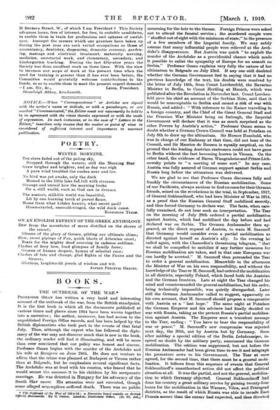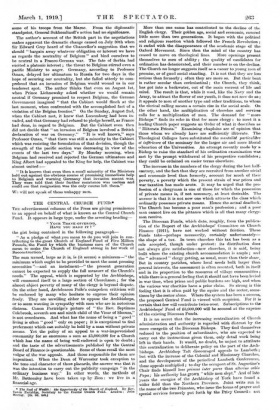BOOKS.
THE OUTBREAK OF THE WAR.*
PROFESSOR OMMT has written a very lucid and interesting account of the outbreak of the war, from the British standpoint. It is the first book in which all the documents published at various times and places since 1914 have been woven together into a narrative ; the author, moreover, has had access to the unpublished Foreign Office records, and has been helped by the British diplomatists who took part in the events of that fatal July. Thus, although the expert who has followed the diplo- macy of the war may not discover much that is new in the book, the ordinary reader will find it illuminating, and will be more than ever convinced that our policy was honest and sincere. Professor Oman begins with the murder of the Archduke and his wife at Serajevo on June 28th. He does not venture to affirm that the crime was planned at Budapest or Vienna rather than at Belgrade, but he emphasizes several significant facts. The Archduke was at feud with his cousins, who feared that he would secure the successi, rt to his children by his morganatic marriage. He wan detested in Hungary for his advocacy of the South Slav cause. His assassins were not executed, though some alleged accomplices suffered death. There was no public • TM 014broak of Me War of 191446: a Yamaha baard.asalak on Metal Offlaid .000111.118. By 0, Oman. London. Stationary ODRA RR dd. not.; mourning for the heir to the throne. Foreign Princes were asked not to attend the funeral service;. the murdered couple were " shuffled out of sight with the minimum of state," in the presence of a few members of the Imperial family. We may safely assume that many influential people were relieved at the Arch- duke's disappearance. But Austria was quick " to exploit the murder of the Archduke as a providential chance which made it possible to enlist the sympathy of Europe for an assault on Serbia." Professor Oman explains very fully the nature of her ultimatum to Belgrade on July 23rd. If any one still doubted whether the German Government lied in saying that it had no previous knowledge of the text, his doubts were resolved by the letter of July 18th, from Count Lerehenfeld, the Bavarian Minister in Berlin, to Count Herding at Munich, which was published after the Revolution in November last. Count Lerchen- feld gave his chief an account of the Serbian Note, said that it would be unacceptable to Serbia and meant a risk of war with Russia, and added : " With reference to the Kaiser travelling in a foreign country, and the Chief of the Great General Staff and the Prussian War Minister being on furlough, the Imperial Government will declare that it was as much surprised as the other Powers by Austria's action." Professor Oman seems to doubt whether a German Crown Council was held at Potsdam on July 5th to draw up the ultimatum. Sir Horace Rumbold, who was in charge of our Embassy at that time, did not hear of the Council, and Sir Maurice de Bunsen is equally sceptical, on the ground that the leading Austrian statesmen could not have gone to Berlin without the fact becoming known in Vienna. On the other hand, the evidence of Baron Wangenheim and PrineeLich- nowsky pointe to " a meeting of some sort" In any case, Austria was fully assured of German support against. Serbia and Russia long before the ultimatum was delivered.
We are glad to see that Professor Oman discusses fully and frankly the circumstances of the Russian mobilization. Some of our Pacificists, always anxious to find excuses for their German friends, seized on the revelations in the trial, in September, 1917, of General Sukhomlinoff, who had been Minister of War in 1914, se a proof that the Russian General Staff mobilized secretly, and thus forced Germany to declare war. The facts, when care- fully examined, do not bear such an interpretation. The Tsar on the morning of July 29th ordered a partial mobilization against Austria, which had mobilized the day before and had declared war on Serbia. The German Ambassador then ap- peared, at the direct request of Austria, to warn M. Sazonoff that Germany would consider even a partial mobilization as directed against herself as Austria's ally. In the evening he called again, with the Chancellor's threatening telegram, " that we shall be compelled to mobilize if any further measures for Russian mobilization are taken, and in that case European war can hardly be averted." M. Sazonoff then persuaded the Tear to order a general mobilization. Meanwhile in the afternoon the Minister of War on his own responsibility, and without the knowledge of the Tsar or M. Sazonoff, had ordered the mobilization in all districts, especially Poland, which faced both the Austrian and the German frontiers. Late at night the Tear changed his mind and countermanded the general mobilization, but his order, being technically impossible, was quietly disregarded. Later still the German Ambassador called to suggest, apparently on his own account, that M. Sazonoff should propose a compromise with Austria as a " last hope." The same night at Potsdam the German Emperor and his advisers had finally decided on war with Russia, taking as the pretext Russia's partial mobiliza- tion against Austria. The Emperor sent a truculent message to the Tsar, ending : " Yon have to bear the responsibility of war or peace." DL Sazonoff's new compromise was rejected next day, the 30th, not by Austria but by Germany. Soon after midday a special edition of the Berlin Lokalanzeiger, in- spired no doubt by the military party, announced the German mobilization. The edition was suppressed, but not before the Russian Ambassador had been given time to see it and telegraph the premature news to his Government. The Tsar at once agreed, for the second time, that there must be a general mobi- lization. It follows from this sequence of events that General Sulthomlinoff e unauthorized action did not affect the political situation at all. It was the partial, and net the general, mobiliza- tion to which Germany objected. General Sukhomlinoff had done his country a great military service by gaining twenty-four hours for the mobilization in the Warsaw, Vilna, and Petrograd districts, as the result of which Russia was able to invade East Prussia sooner than the enemy had expected, and thus diverted
some of his troops from the Marne. From the diplomatic standpoint, General Sukhomlinoff's action had no significance.
The author's account of the British part in the negotiations makes apparent the dramatic change caused on July 30th when Sir Edward Grey heard of the Chancellor's suggestion that we should " bargain away whatever obligation or interest we have as regards the neutrality of Belgium" and bind ourselves to be neutral in a Franco.German war. The fate of Serbia had excited a platonio interest ; the threat to Belgium stirred even a pacific Ministry to anger. Germany, according to Professor Oman, delayed her ultimatum to Russia for two days in the hope of securing our neutrality, but she failed utterly to com- prehend that an invasion of Belgium would wound us in our tenderest spot. The author thinks that even on August 1st, when Prince Lichnowsky asked whether we would remain neutral if Germany promised to respect Belgium, the German Government imagined "that the Cabinet would flinch at the last moment, when confronted with the accomplished fact of a violation of the Belgian frontier." On the Sunday, August 2nd, when the Cabinet mot, it knew that Luxemburg had been in- vaded, and that Germany had refused to pledge herself, as France had done, in regard to Belgium. But the Cabinet even then did not decide that " an invasion of Belgium involved a British declaration of war on Germany." " It is well known," says Professor Oman, " that there was still a minority in the Cabinet which was resisting the formulation of that derision, though the strength of the pacific section was decreasing in view of the events of the last two days." By Monday morning, when Belgium had received and rejected the German ultimatum and King Albert had appealed to the King for help, the Cabinet was almost united :-
" It is known that even then a small minority of the Ministers held out against the obvious course of promising immediate help to Belgium and warning Germany that invasion meant war. They were told that their further resistance was useless and could see that resignation was the only course left them."
We will not speak of these unhappy men.



































 Previous page
Previous page